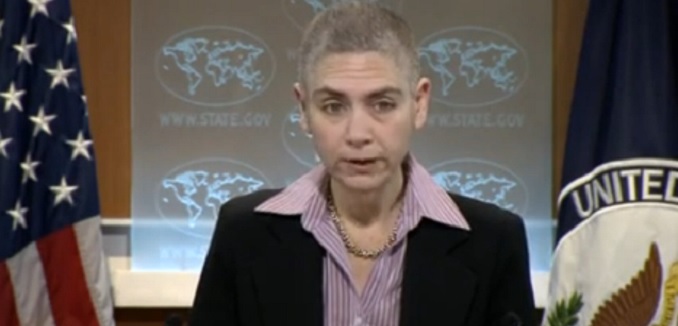The State Department on Wednesday published [PDF] its annual country-by-country terrorism roundup, a 318-page document that veteran Associated Press diplomatic writer Matt Lee nonetheless described as “singl[ing] out Iran as a major state sponsor of terrorism that continues to defy demands it prove its atomic ambitions are peaceful.”
The report described Iran as funding both Sunni and Shiite fighters, both across the region and globally. Specific sections of the report took harsh tones not often found in diplomatic assessments:
Despite its pledge to support Iraq’s stabilization, Iran trained, funded, and provided guidance to Iraqi Shia militant groups. The IRGC-QF, in concert with Hizballah, provided training outside of Iraq as well as advisors inside Iraq for Shia militants in the construction and use of sophisticated improvised explosive device technology and other advanced weaponry. Similar to Hizballah fighters, many of these trained Shia militants then use these skills to fight for the Asad regime in Syria, often at the behest of Iran.
Another paragraph blasted Iran for facilitating the movement of Al Qaeda members across the Middle East:
Iran remained unwilling to bring to justice senior al-Qa’ida (AQ) members it continued to detain, and refused to publicly identify those senior members in its custody. Iran allowed AQ facilitators Muhsin al-Fadhli and Adel Radi Saqr al-Wahabi al-Harbi to operate a core facilitation pipeline through Iran, enabling AQ to move funds and fighters to South Asia and also to Syria. Al-Fadhli is a veteran AQ operative who has been active for years. Al-Fadhli began working with the Iran-based AQ facilitation network in 2009 and was later arrested by Iranian authorities. He was released in 2011 and assumed leadership of the Iran-based AQ facilitation network.
The final allegation has sometimes been controversial in the intelligence community. Iran has been unequivocal in its support for the Bashar al-Assad regime – Iranian President Hassan Rouhani made a point of underlining Tehran’s commitment to the Assad regime in the immediate aftermath of his election – and some analysts and diplomats doubted that the Iranians would also allow Sunni jihadists battling the regime to transit through Iranian territory.
Other observers emphasized that Iran had every interest in using both Shiite and Sunni fighters to crowd out the moderate opposition facing Assad, which would allow Damascus to characterize the country’s bloody war as an anti-terror struggle. The Treasury Department last February announced that it had evidence that – per Lebanon’s Daily Star– “Iran is assisting key Al-Qaeda figures to transfer Sunni fighters into Syria.”
The State Department report’s broad criticism of Iran came up during Thursday’s daily State Department press briefing:
QUESTION: I see that Iran was not pleased about being kept on the list of State Sponsors of Terrorism. They reacted quite angrily this morning to it.
MS. HARF: Well, then they should stop supporting terrorism.
[Photo: New13 / YouTube]




